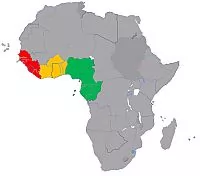Event: The state-owned Federal Mortgage Bank of Nigeria (FMBN) and the Federal Housing Authority (FHA) announced in May 2016 that they would soon be signing a memorandum of understanding (MoU) to deliver 1 million affordable housing units across the country.
Main Findings:
Affordable for Some?
Nigeria has a housing deficit of 17 million units with a market
value of US$12 billion according to the government's 2014
figures1. This constraint is felt most keenly in the
economic hubs of Lagos, Abuja, Port Harcourt and Calabar, where
quality accommodation is becoming increasingly unaffordable even
for those in the formal sector with disposable income. For example,
in top end middle class neighbourhoods such as Gbagada and Ifako in
Lagos, a 3-bedroom apartment costs between NGN700,000
(USD3,5172) and NGN800,000 in yearly rent while a
2-bedroom apartment goes for NGN450,000 to NGN500,000. In the
highbrow areas of Victoria Island, Ikoyi and Lekki, decent
accommodation is an exclusive preserve of the
rich. By way of comparison, a bank teller or
doctor would earn NGN150,000 to NGN300,000 per month while a
manager at one of the major banks might bring home NGN700,000 per
month. Also, it should be noted that rent is
typically paid one to two years in advance.
In response, the housing policy of the People's Democratic Party (PDP) government, voted out last year, was to build 10,000 units annually3. In keeping with that broad goal, the present move by the FHA and FMBN to address the housing gap together – with the former providing land and the latter financing - is in fulfilment of the government's plan to make affordable housing available to the civil work force.
For FMBN, it is a continuing relationship between itself and the FHA, which it has supported with a loan facility to build more than 250 housing units in the Obada-Oko Estate in Ogun State. Additionally, in March 2016, the FMBN commissioned a 260-housing unit in Abuja for the Nigerian Police Force with the former institution partly funding the project.
Bridging the Mortgage Gap
Despite Nigeria being a political and economic force on the African
continent, it falls behind its peers in terms of home ownership and
mortgage financing. As it stands now, Nigeria has one of the
lowest rates of home ownership in Africa at 25% compared with 63%
in Benin, 56% in South Africa and 73% in Kenya4. This is
further compounded by low mortgage financing, amounting to 0.5% of
GDP compared with 2% in Ghana and 31% in South Africa.
To address some of these challenges, the FMBN, which is under new leadership, has raised US$959m through its National Housing Fund (NHF), which has 4.14m contributors5. This fund is to support contributors who want to get onto the housing ladder.
To date, the FMBN has financed over 25,600 housing units as well as issuing 16,505 mortgages. In advancing FMBN position to bridge the housing deficit, the bank has plans of further financing over 15,000 housing units as well issuing 10,726 loans towards mortgages.
Outlook:
Real estate development continues apace in affluent hotspots such
as new Lagos (in the Lekki-Ajah-Epe axis). Nevertheless, present
supply and demand pressures mean that middle class Lagosians and
their peers in other parts of the country are being pushed from
traditionally middle class areas such as Gbagada to the more
affordable alternatives of Ikorodu in Lagos or Mowe in Ogun
state.
There, the houses and/or land may be cheaper but the price they pay includes a punishing commute into the business centres e.g. leaving home at 4am in order to reach Victoria Island, Ikoyi, Lekki or Apapa in time for an 8am start.
Such unmet demand presents an opportunity, particularly for those developers providing low-cost solutions. To an extent, Nigeria's housing deficit should be viewed as fiscal more so than physical, a question of affordability rather than availability. The FMBN and FHA MOU attempts to address both.
Footnotes
2 Official exchange rate of USD1/NGN199. At the current unofficial exchange of USD1/NGN347 it is USD2,017
5 http://www.thisdaylive.com/index.php/2016/05/23/as-fmbn-repositions-for-efficiency/
The content of this article is intended to provide a general guide to the subject matter. Specialist advice should be sought about your specific circumstances.


